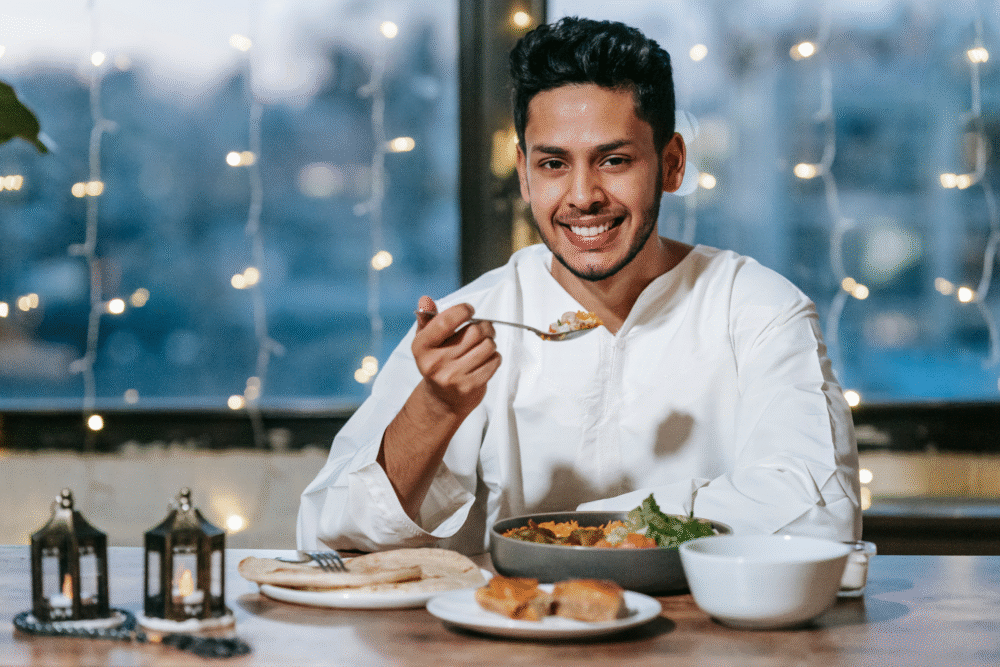Eating right gets a whole lot easier when you actually know what your body needs.

Your body’s been trying to talk to you—you just haven’t been taught how to listen. That bloated feeling after a “healthy” meal? The crash an hour after breakfast? The cravings that show up out of nowhere? They’re not random. They’re messages. But most of us were raised to ignore our bodies and follow rigid food rules instead. You’re told what to eat, how much, and when—no questions asked. And when it doesn’t feel right, you blame your willpower instead of realizing the plan wasn’t built for you.
The truth is, your body isn’t the enemy. It’s actually incredibly wise. It knows when something’s off. It nudges you with subtle signs and sometimes yells with symptoms when things go too far. Once you start tuning in, things begin to click. Eating becomes less about control and more about communication. Your energy shifts. Your mood steadies. Your gut calms down. It’s not about being perfect—it’s about getting curious. Because when you stop ignoring your body’s clues and start responding to them, eating smarter stops feeling like a struggle and starts feeling like self-respect.
1. You stop eating foods that make you feel “meh” just because they’re labeled healthy.

Just because something’s trending or labeled organic doesn’t mean it’s right for you, according to the experts at NHS. Kale might make your friend feel like a superhero, but maybe it wrecks your stomach. Quinoa’s great in theory—unless it makes you feel like you swallowed a brick. You’ve probably forced down meals that checked all the “clean eating” boxes, even while your body was clearly saying, Nope. That disconnect adds up. You leave the table feeling unsatisfied, uncomfortable, or weirdly tired, and you chalk it up to “just getting older” or not being disciplined enough. Nope. You’re just ignoring your body’s feedback. Food should give you energy—not take it away. If a “healthy” food doesn’t leave you feeling good afterward, it’s not healthy for you. Period.
Listening to your body means respecting its reaction, not pushing through for the sake of a label. Once you stop eating for image and start eating for impact, things shift. Meals become more satisfying, and your energy actually lasts. You deserve to eat food that works with your system—not against it just to follow the hype.
2. You notice how different types of hunger feel—and don’t treat them all the same.

Not all hunger is created equal, as reported by the authorities at CDC. There’s that slow-building, body-based hunger that says, Hey, it’s time to fuel up. Then there’s the emotional kind, whispering, I’m stressed, bored, or need comfort. And sometimes, it’s just your blood sugar crashing because your last meal didn’t stick. If you’re treating every hunger cue like it’s the same old story—grab something quick and move on—you’re missing what your body’s actually asking for. Listening means paying attention to the why, not just the when. Maybe your body’s low on protein, or maybe your soul just needs a break. The more you practice checking in before eating, the more you start to recognize the patterns.
And this isn’t about guilt or eating “perfectly.” It’s about clarity. Once you know the difference between physical and emotional hunger, you’re not at the mercy of every craving or urge. You respond instead of react. That’s what smart eating looks like—it’s not restrictive; it’s intuitive. And it doesn’t mean saying no to comfort food—it means knowing when that’s what you truly need and choosing it with awareness.
3. You pay attention to how long your meals keep you full—and tweak things from there.

If you eat lunch and feel ravenous two hours later, your body’s not being unreasonable—it’s giving you useful data, as stated by the experts at the World Health Organization. Same goes for a dinner that leaves you grazing through the pantry by 9 p.m. Instead of blaming yourself for “bad willpower,” ask what was missing. Did you skimp on protein? Forget healthy fats? Eat something high in sugar and crash? These aren’t failures—they’re clues. Your body is constantly telling you what it needs to feel nourished and satisfied. When you start noticing how long your meals hold you over, you can start adjusting with real precision. Maybe that means adding avocado to your salad, tossing nuts into your oatmeal, or swapping out a low-cal snack for something more substantial.
It’s not about counting calories—it’s about building meals that actually work for you. When you get this right, you stop obsessing over food between meals because your body feels calm and balanced. That kind of satiety isn’t just physical—it’s mental freedom. You’re not just eating to get by. You’re fueling in a way that finally feels like it fits.
4. You stop ignoring your digestion and treat it like a personal feedback system.

Your gut isn’t just handling food—it’s talking to you. Bloating, gassiness, weird cramps, that post-meal heaviness? Those aren’t just annoying—they’re messages. Your body is waving little red flags, asking you to pay attention. Maybe it’s too much dairy. Maybe gluten doesn’t sit right. Or maybe you’re eating too fast, multitasking, and stressing your system out. Whatever the case, when you keep brushing those symptoms off, you’re teaching your body that it doesn’t get a say. But when you tune in and start connecting the dots between what you eat and how you feel afterward, things start making sense. You realize that “normal” digestion isn’t supposed to be uncomfortable.
Once you figure out what foods support smooth digestion and which ones derail it, your meals stop feeling like a gamble. It’s not about cutting out everything forever. It’s about curiosity. What makes your body feel good consistently? When digestion is working, everything else gets easier—your mood, your energy, even your sleep. So if your stomach’s been trying to get your attention, maybe it’s time to start listening.
5. You notice how your mood shifts based on what you eat—and use that to your advantage.

Food and mood are way more connected than we’re taught. Ever had a sugary breakfast and then felt anxious or irritable an hour later? Or skipped lunch and suddenly everything and everyone seems more annoying than usual? That’s your body calling out for support. Blood sugar dips, caffeine overload, and nutrient imbalances all mess with your emotional state. But when you start to track how different meals impact your mood, you’ll be shocked at how much power you actually have. That lunch with protein and fiber that kept you calm all afternoon? That’s not a fluke—it’s intel. Over time, you start creating a personal playbook.
You learn which foods ground you and which ones spike your energy and then leave you crashing. It’s not about chasing some perfect “clean” diet—it’s about eating in a way that helps you stay steady, not spiky. When you feel emotionally regulated, everything feels more manageable. Conversations go better. Work gets easier. Your inner critic quiets down. The food on your plate isn’t just fuel—it’s emotional support, if you know how to use it.
6. You experiment with meal timing instead of eating by the clock.

You’ve probably heard all the rules—don’t skip breakfast, never eat after 8 p.m., snack every three hours, blah blah blah. But what if your body doesn’t thrive on those schedules? What if you’re forcing yourself to eat when you’re not hungry or ignoring hunger because “it’s not lunchtime yet”? That disconnect can lead to mindless snacking, energy crashes, or meals that feel more like a chore than nourishment.
When you stop letting the clock dictate your meals and start tuning in to your real hunger rhythms, things get a whole lot simpler. Maybe your body runs better on two solid meals and a snack. Maybe you feel amazing eating later in the morning. It’s all fair game—as long as it works for you. Experiment. Notice when your energy dips or peaks. Adjust based on your daily rhythm, not some outdated advice. The magic isn’t in the perfect schedule—it’s in building a flexible rhythm that actually supports your life. You’re not a machine that needs fueling at preset times. You’re a living, breathing human—and your hunger knows what’s up.
7. You ditch restrictive food rules that make you feel like you’re constantly “failing.”

You’ve probably been told to cut this, avoid that, and never touch certain foods again. The list of “bad” foods gets longer, and your meals get sadder. But instead of feeling empowered, you just feel…guilty. Like every bite is a moral decision. That kind of rigid mindset doesn’t lead to balance—it leads to stress, obsession, and eventually rebellion. Because here’s the thing: your body doesn’t thrive under food fear. It thrives under consistency, freedom, and trust. When you stop labeling foods as good or bad and start asking how they actually make you feel, you shift the focus from control to curiosity. That cookie might not be the problem—your fear around it might be.
Once you ditch the mental punishment and start approaching food with flexibility, you’ll notice your cravings chill out, your guilt fades, and your choices become more intentional. It’s not about eating whatever, whenever. It’s about no longer eating from a place of fear or self-hate. Food rules weren’t written with your body in mind—so maybe it’s time you write your own.
8. You adjust your meals to match your energy output—not some fixed portion size.

Some days you’re moving a lot. Other days, you’re parked in front of a screen. But if your plate looks exactly the same on both days, you’re missing a major opportunity to support your body. It’s not about restricting or overeating—it’s about being responsive. Your body isn’t a robot that burns the same number of calories daily. It fluctuates based on activity, stress, hormones, and sleep. So when you start thinking of food as fuel, you naturally begin adjusting. Maybe you eat more on workout days or days with lots of errands and less on days you’re mostly resting. There’s no guilt—just observation and response.
This helps prevent overeating from boredom or undereating from habit. And when you match your fuel to your demand, everything runs more smoothly—your focus, your digestion, your sleep. It’s a flexible, forgiving rhythm that actually honors what your body’s doing today. You stop eating based on a number from a chart and start eating based on the one expert who actually lives inside your body: you.
9. You recognize cravings as messengers, not mistakes.

Cravings get a bad rap. We’re taught to see them as signs of weakness or poor discipline. But what if your cravings are actually trying to tell you something? Maybe your sugar craving is a cry for quick energy because you skipped lunch. Maybe your sudden need for chips is your body asking for sodium after a sweaty day. Or maybe—brace yourself—you just need something comforting. Cravings don’t always mean you’re doing something wrong. They often mean something’s missing—physically, emotionally, or even hormonally. When you start treating cravings like messengers, not enemies, you can actually work with them instead of against them.
You get curious instead of critical. And sometimes, yes, that means satisfying the craving—but in a way that’s mindful, not mindless. Other times, it means pausing to ask what’s really going on. Either way, you’re building trust with your body. And that trust makes it easier to stop the restrict-binge cycle and eat in a way that feels steady, satisfying, and sustainable. Cravings don’t mean you’re broken. They mean you’re paying attention.
10. You eat slower so your body has time to tell you when it’s had enough.

It sounds simple, but slowing down your eating can completely change how you feel after meals. When you rush, your brain doesn’t get the signal in time that you’re full. You shovel in more than you need, feel stuffed, and then beat yourself up. But it’s not a willpower issue—it’s a pacing issue. Your body needs time to catch up. When you eat slowly, you start noticing texture, flavor, and satisfaction sooner. You become more present, and that mindfulness helps you naturally stop when you’ve had enough—not when the plate’s clean or your stomach is screaming. This doesn’t mean eating in total silence or chewing 37 times per bite. It means pausing, breathing, tasting, and checking in halfway through.
It might feel weird at first, especially if you’re used to eating on autopilot. But once you feel how much better your body responds—lighter, calmer, more energized—you’ll never want to go back. Eating slower is one of the simplest ways to listen to your body. And it’s completely free. Just a little more time, and a whole lot more awareness.
11. You let satisfaction—not just nutrition—guide your food choices.

You can build the most nutrient-dense, perfectly balanced plate—but if it doesn’t taste good or satisfy you, it’s not going to work long-term. You’ll end up feeling deprived and reaching for snacks an hour later. Nutrition matters, of course. But so does pleasure. So does the feeling of, Wow, that really hit the spot. When you ignore satisfaction, you disconnect from the part of eating that keeps it joyful—and sustainable.
Listening to your body means asking not just, Is this nutritious? but also, Will this satisfy me? That might mean adding cheese to your salad or choosing the heartier option instead of the lowest-calorie one. When meals are both nourishing and satisfying, cravings decrease, overeating fades, and food becomes easier to manage overall. You feel balanced because your body and brain both feel fulfilled. So stop eating like a calculator. Eat like a human. Choose the meals that nourish and delight you. That’s not indulgence—it’s smart strategy. Because when you walk away from the table content, you’re far less likely to chase more food later.
12. You tune in to how certain foods affect your sleep and let that guide your choices.

You probably know that caffeine too late in the day can mess with your sleep, but there’s a lot more your body’s trying to tell you after hours. Ever had a big, greasy dinner and then laid awake with heartburn or restlessness? Or maybe you wake up at 3 a.m. after a sugary dessert, wide-eyed and wired. These aren’t random sleep issues—they’re clues. Your body doesn’t just clock out when you do. It’s working overnight to digest, repair, and rebalance. When your food choices make that job harder, your sleep suffers. And poor sleep messes with your hunger hormones, which throws off the next day’s eating.
It’s a cycle—and your plate plays a big role. When you start noticing what helps you sleep deeply and what disrupts your rest, you can make smarter choices without following strict rules. Maybe it’s eating earlier. Maybe it’s cutting down on sugar at night. Whatever the pattern, your sleep is a powerful feedback loop. It’s not just about bedtime routines—it’s about how your entire day supports or sabotages your rest.
13. You trust your body more than the next big food trend.

There will always be a new diet, a magic food, or a set of “rules” claiming to fix everything. Keto, paleo, raw, low-FODMAP, plant-based, intermittent fasting—take your pick. Some of them have merit. Some might actually work well for you. But none of them are smarter than your body. And if you’re constantly chasing the next big thing while ignoring what your body is actually telling you, you’re just collecting confusion. Listening to your body means you become the expert. You notice what works and what doesn’t. You stop outsourcing your intuition to someone else’s plan.
That doesn’t mean you can’t try new things—it just means you evaluate them based on your results, not the hype. You don’t need a flashy label or an all-or-nothing plan. You need self-awareness and trust. When you eat in a way that genuinely feels good—physically, emotionally, energetically—you won’t need to keep starting over. You’ll already have the answers. Trends come and go, but your body is with you for life. And it’s got more wisdom than any food influencer ever will.